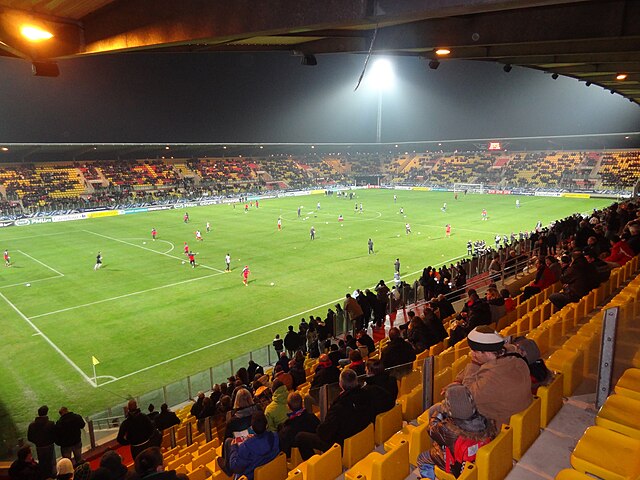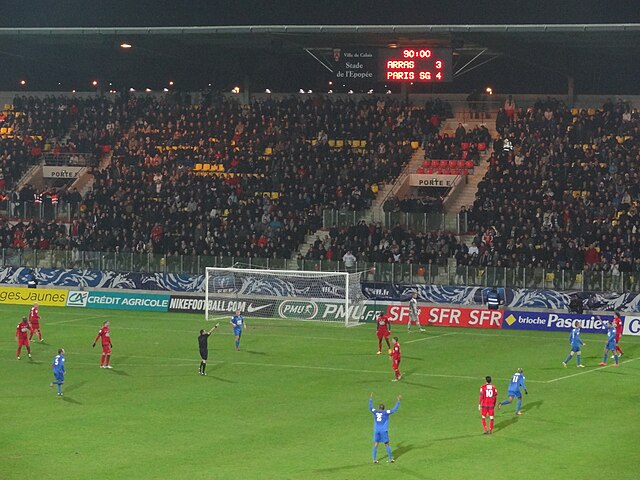How a football team full of gardeners, store workers and teachers from Calais, one of the most economically deprived areas in France made their way to fame in 2000.
If you were asked to picture a cup upset, most people would imagine your standard story – a team from a league or two below, holding out to scrape past a much superior opposition. A tiny chance of winning the match. A story about a remarkable, one-in-a-hundred game.
Now imagine 11 games.
If anyone was asked what they knew about Calais’ little football team in the fourth division of French football, the vast majority would have never even heard of their existence. By May of 2000, their name would be known by not just any football lover in France but across the world.
In 2000, the small port town in the north of France contained a population of just over 75,000. Half of the population had a yearly income of less than £5,000, with the unemployment rate at 17%. With severe economic trouble along with immigration problems, not many batted an eye when it came to their amateur football team.
Henri Chastain, 44, said he would occasionally attend games while growing up in the town.
“The local team never used to be very good. We knew we weren’t watching high-quality football, but we would go to support when we could. The club was in a lot of debt. On a good weekend, they would get 300 supporters at the game.”

None of the Calais squad was anywhere near the professional level. At the time, the majority of their squad worked local jobs in the town. Midfielder Stephane Canu was a gardener, right-back Jocelyn Merlen was a sales representative, and winger Mickael Gerard worked in a shop selling alcohol to British tourists. Their manager, Ladislas Lozano, worked for the town council.
None of the Calais players received any form of salary from the club.
As the season began, the club entered the Coupe de France in the fourth round. Professional clubs did not enter the competition until the seventh round. After beating other amateur clubs such as Saint-Nicolas-les-Arres, Marly-les-Valenciennes and Bethune, Calais saw off Dunkerque – their first semi-professional opponent in the competition – before being drawn against their first professional team in Ligue 2 side Lille.
No one gave Calais even a shred of a chance coming into this game. Due to the competition rules, they were to play the game at their home stadium, Stade Julien-Denis.
“The word “stadium” was putting it nicely!” laughed Henri.
“It was no more than a singular stand with a few hundred seats and rotten nets behind the goal, to prevent wayward shots from hitting cars on the main road by the ground!”
Regardless of this, the little ground was packed to the rafters with locals on a cold January afternoon as Calais battled to a tense 1-1 draw against Lille, before miraculously defeating the professional side 7-6 in a penalty shootout to advance to the next round.
This victory was one of the most beautiful forms of giant-killing that football can provide. A team full of local lads, working in the town as shopkeepers, electricians and teachers, had just knocked out a professional football team full of players earning thousands. But Calais’ fairytale wasn’t over yet.
In the next round, Calais breezed past Langnon-Castets 3-0 before being drawn against yet another Ligue 2 side in Cannes. The little Stade Julien-Denis, with a maximum capacity of just over 2,000, saw a whopping 7,500 fans attend the match, all dreaming of yet another upset.
Another nail-biting 1-1 draw took the game to penalties once again, where 24-year-old Calais goalkeeper Cedric Schille became a local hero as he saved three Cannes penalties to win the game and send the amateur team into the quarter-finals of the Coupe de France.
Lucas Lavigne, 46, says the match provided fond memories for the small town.
“After the game against Cannes, Calais went crazy. You could go anywhere in the town, and the only thing you would hear about was the football. Town folk everywhere were excited about the idea of playing against France’s biggest teams, the likes of Lyon, Bordeaux and Monaco.”
Calais were rewarded with a quarter-final matchup against Ligue 1 side Strasbourg – their first opponent from the highest tier of French football. With Strasbourg boasting some incredible players such as Habib Beye and Diego Garay, even the most positive Calais fan knew this would be a near-impossible task.
However, this did not put off the unwavering support of the Calais locals – in fact, it made them even more determined. The demand for the match was so high that although Calais was the home side, the match had to be moved to Lens, simply because the Stade Julien-Denis was nowhere near big enough.
“The people of Calais were like an army” remarked Lucas, who was one of the thousands travelling to Lens to watch his team play.
“Lens was 50 miles from home and we took 250 buses full of our fans to the game.”
A crowd of 27,000 witnessed a piece of history as Calais emerged 2-1 winners, thanks to goals from Merlen and midfielder Christophe Hogard, a social worker.
“I cried that day,” said Lucas.
The Calais players, who had never received a footballing salary or played professionally, were each awarded a £2,000 bonus and an incredible amount of public attention following the win. They were into the last 4.
When the club were drawn against Bordeaux – the reigning French champions – it may well have been the loudest the town had ever been. After being handed yet another home tie, it seemed like Calais itself would be a ghost town on the day of the game, with tens of thousands of locals preparing to travel once again to Lens.
Maxence Tremblay, 56, said he was prepared to get down to the match in Lens no matter what.
“The semi-final was on a Wednesday night. I was worried I would lose my job when I told them I was going to Lens and wouldn’t be at work that week. Turns out everyone else in the office was going too!”
A warm midweek night in Lens saw a determined Calais team take a Bordeaux side – filled with Champions League and French international standard players – to extra time, before miraculously running out 3-1 winners.
“That night was the greatest party of my life,” said Maxence. “The locals in Lens must have hated us. However, a few of them came to Calais to celebrate with us after the match!”
The 40,000 Calais residents returned home that night but remained in the streets until daylight, with a special team reception in the town hall followed by an open-top bus tour at three in the morning. The players, who each received £10,000 for their incredible win, were invited to a duck and foie gras dinner at the fanciest restaurant in Calais, where they remained until the morning.
The celebrations in the little town were so wild that manager Lozano suffered a faint, resulting in a three-day hospital trip for a minor heart attack. He awoke to a phone call from French president, Jacques Chirac, congratulating him on his incredible success.
For the next three weeks, the entirety of France was afoot with what they called “Calaismania.” Every football fan in the country knew the names of the eleven local lads from the town, and famous magazines such as Le Parisien and Libération showed headlines such as “All of France behind Calais”.
Calais became the first amateur team to reach a final in any recorded cup competition in the world. It was no wonder that the entire town, along with most of the country, would be watching the final against Nantes.
78,000 spectators thought they were about to see the most beautiful fairytale in football as Calais came in at half-time 1-0 up in Paris. However, hearts were broken as they conceded two second-half goals, the latter coming in the 90th minute.
Regardless of the result, the Calais team had become national heroes. After the game, Nantes captain Landreau invited his Calais counterpart Reginald Becque to lift the trophy together. After the match, President Chirac once again spoke to Lozano, calling his Calais side “the real winner”.
Lozano praised his side after the game – saying that together they had “written one of the most beautiful pages in French football history”.
Calais Racing Union continued to play amateur football after their famous cup run, which was voted the ‘best of all time’ by France Football magazine. However, due to financial problems, the club went bankrupt and was forced to liquidate in 2017.
However, their spirit lives on in France as the greatest underdog story the country has ever seen. In 2008, they opened their new stadium which still stands today – the Stade de l’Épopeé – in tribute to their fairytale.
In French, it translates to an epic saga of defying the odds.







